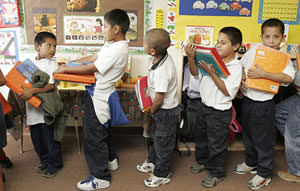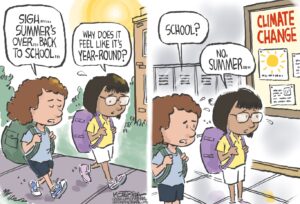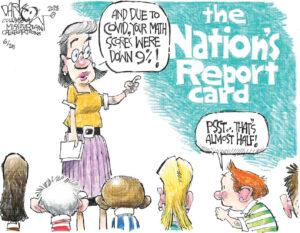The Education Blame Game
It's not just kids who get left behind in an educational system that fetishizes data and quantitative measures instead of qualitative progress. Teachers, particularly in lower-income schools, end up punished and humiliated because they are judged to be "underachievers," according to educator Sharon Scranage.
Editor’s Note: Sharon Scranage teaches at one of the poorest school districts in Southern California, with a predominately English Language Learner student base. With the help of classroom strategies used expressly for students from poor families, students were able to surpass expectations on their standardized tests, performing at grade level or above in both language arts and math. But more important, they learned not to underestimate themselves.
The No Child Left Behind Act has received criticism from educators and policy pundits, primarily because of unrealistic goals that often stigmatize schools and the teachers connected with them as “underachievers.” In the quest for accountability, unattainable benchmarks of quantitative success have replaced the more reasonable and humane goals of qualitative growth and improvement. Despite tremendous student progress in many schools, the inability to meet API or APY standards often leaves teachers and staff frustrated, humiliated and punished for their efforts.
The humiliation stems from the assumption that teachers are the sole reason behind underachieving schools; the punishment comes in the form of increased “policing” through top-down programs dispersed by the state and the school districts. Adding insult to injury, the teachers are asked to be part of the planning process for upcoming years after “failing to make the grade.” Again, the onus of responsibility for student success seems to rest entirely on the teachers. In taking this approach, the school districts have a built-in escape clause should the teachers’ “future plans” fail, which they inevitably will, once again making the teachers the cause for failure and the ultimate scapegoats in the blame game.
There are schools that meet their goals and do not experience this phenomenon. However, in low-income schools where there is a constant influx of newcomers and second-language learners, this scenario continues to repeat itself. Superior achievement is determined solely through “data” goals, which fail to take into account true student learning and achievement. This approach makes it impossible to properly support the essentialist curriculum and innovative classroom strategies that teachers and their students require for successful learning.
Imagination and ingenuity will not raise test scores, therefore schools are often unable to support the equally valid goals of talented students who do not test at a certain level. Developing the hidden and even obvious gifts of a student body is often overlooked in lieu of promoting tested skills. This philosophy has permeated most public schools, but the tragedy for children in impoverished areas is a lack of access to extracurricular activities and experiences that would contribute to their academic achievement and talent development. Without these opportunities, many children will leave school without any of the tools they need to build upon their innate talents and abilities.
Until a school and its teachers are allowed to set goals above merely quantitative “data” measurements, we will be destined to continue the cycle that No Child Left Behind has promoted. Until then, even with its impending threats, our educational system will remain mediocre and it will continue to blame other parties for its lackluster results.
Dig, Root, GrowThis year, we’re all on shaky ground, and the need for independent journalism has never been greater. A new administration is openly attacking free press — and the stakes couldn’t be higher.
Your support is more than a donation. It helps us dig deeper into hidden truths, root out corruption and misinformation, and grow an informed, resilient community.
Independent journalism like Truthdig doesn't just report the news — it helps cultivate a better future.
Your tax-deductible gift powers fearless reporting and uncompromising analysis. Together, we can protect democracy and expose the stories that must be told.
This spring, stand with our journalists.
Dig. Root. Grow. Cultivate a better future.
Donate today.








You need to be a supporter to comment.
There are currently no responses to this article.
Be the first to respond.